This post was sponsored by Similarweb. The opinions expressed in this article are the sponsor’s own.
Any good athlete knows the value of watching a competitor’s games to study their strategy and learn how they move.
The game of SEO is essentially the same: you have to predict your competition’s next move if you’re going to beat them.
Many SEO professionals are forced to work under the business’s assumptions about who they’re fighting with for organic search traffic, instead of fighting their true SEO competitors.
Oftentimes, the pros are left guessing what the other brand’s SEO strategy involves.
That’s not how you score a touchdown.
If you want to know when to zig and when to zag, there are seven key things to keep in mind.
How To Find & Outrank Your True SEO Competitors
To outrank the online competition who may be taking a large share of your target market, you’ll need to focus on each of these seven SEO plays:
- Discover.
- Rule Out.
- Identify.
- Uncover.
- Select.
- Refine.
- Outperform.
1. Discover: SEO Competitor Or Just A Brand Competitor?
Reliably naming your competition is the first hurdle in this process.
This might seem basic, but digital competitors may actually differ from brand competitors.
Brand competitors can change for every line of business, and furthermore, some businesses’ online competitors may not be actual SEO competitors.
How To Discover Actual SEO Competitors
The first step is to discover all of your competitors.
Then, you’ll be ready to see if and how they’re excelling at SEO.
At this point, you can create segmented lists of brand and SEO competitors.
Pro Tip: An easy way to do this is by checking your site on Similarweb > Similar Sites.
Once you see the results, it will be easy to group your competition by “brand competitors” and “digital SEO competitors.”
From here, you can begin to pivot your SEO strategy to focus solely on your true SEO competitors.
Example: easyJet
In the case of easyJet, British Airways is a brand competitor for overall marketing.
However, as we see in Similar Sites on Similarweb, britishairways.com is not an SEO competitor – skyscanner.net is a stronger SEO competitor to track and outrank.
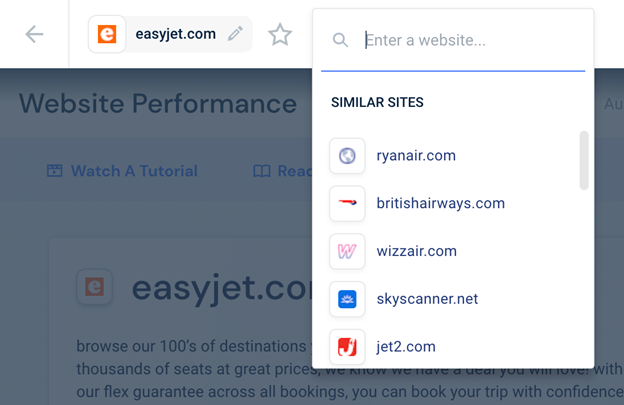 Screenshot from Similarweb Digital Marketing Intelligence, easyjet.com and Similar Sites option, December 2021.
Screenshot from Similarweb Digital Marketing Intelligence, easyjet.com and Similar Sites option, December 2021.It’s more worthwhile to dig into Skyscanner and focus your efforts there, ignoring those who are only brand competitors.
We can see that Skyscanner, and other SEO competitors, are focusing their efforts and driving lots of search traffic.
EasyJet’s new goal is to gain parts of Skyscanner’s traffic share, effectively reducing the overall market share of a direct online competitor.
Bonus Step: Understand The Level Of Your Competition
While you’re digging into competitors, take a peek at their marketing channel performance with Similarweb’s Marketing Channel Analysis.
Our data reveals that all easyJet’s SEO competitors are above the Travel and Tourism industry average, as seen in the bars that break through the grey “industry average” box.
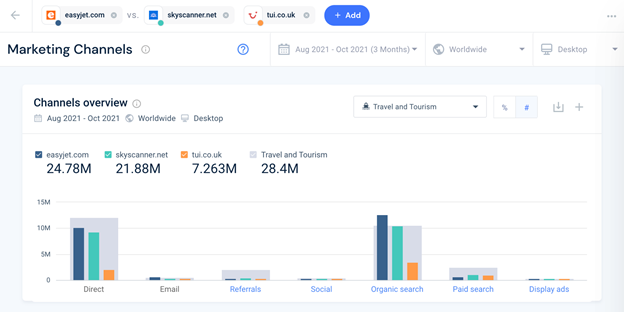 Screenshot from Similarweb Digital Marketing Intelligence, Marketing Channels Overview, December 2021
Screenshot from Similarweb Digital Marketing Intelligence, Marketing Channels Overview, December 2021You also gain insights into how fierce the competition is and where they are focusing their efforts, allowing you to give data to peers in other departments, such as PPC.
2. Rule Out: Low-Trending SEO Competitors
SEO traffic and trends constantly change, so after you’ve successfully marked the competition, your next step is to figure out their organic search trends.
Simply put, have these companies always been your competition for search traffic, or did they recently put more effort into search?
How To Rule Out Low-Trending Competitors & Focus On True Competition
Research, plot, and compare each SEO competitor’s organic search traffic trends over time.
If a competitor is consistently trending high or has a sudden increase in search gains, they are worth looking into. However, if an SEO competitor is consistently trending low, you should avoid researching their SEO strategy.
Pro Tip: An easy way to see this SEO competitor benchmarking, visit Similar Web > Digital Marketing Intelligence.
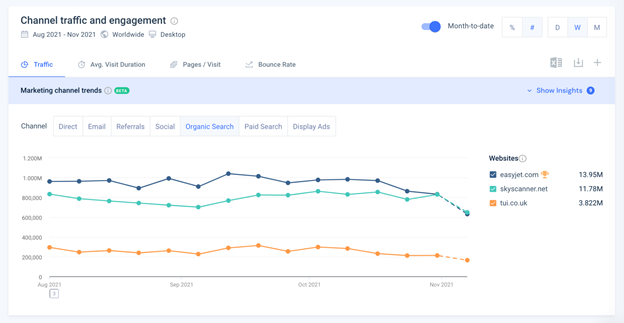 Screenshot from Similarweb Digital Marketing Intelligence, organic traffic and engagement line graph, December 2021
Screenshot from Similarweb Digital Marketing Intelligence, organic traffic and engagement line graph, December 2021Example: easyJet
Inside of Similarweb’s Digital Marketing Intelligence, you can switch your toggle from numerical value to percentages.
This allows you to easily see that easyjet.com and skyscanner.net are neck and neck in how much organic search traffic they win in the travel and leisure space.
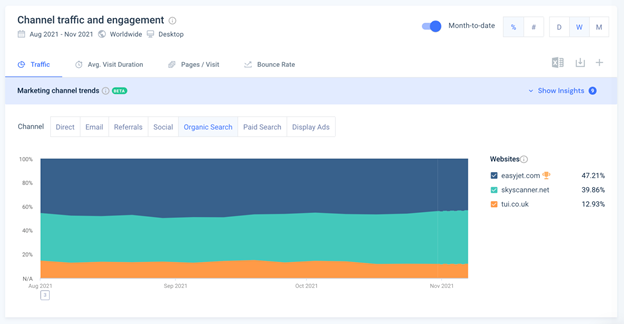 Screenshot from Similarweb Digital Marketing Intelligence, organic traffic percentage, December 2021
Screenshot from Similarweb Digital Marketing Intelligence, organic traffic percentage, December 2021The data tells us that these two always have been close, while TUI.co.uk has, for the most part, trailed behind.
It would be a mistake for EasyJet to look at TUI to help advance its strategy because TUI doesn’t perform well in SEO.
However, if TUI suddenly saw a massive spike in organic search traffic, then easyJet would want to pinpoint what change TUI made to drive more search traffic.
Learning how your competitors’ organic traffic rises and falls lets you see what is working for them and what is not.
3. Identify: Competitor’s Powerhouse Content
It’s not enough to just know who your competitors are in today’s digital world; you have to know how they’re driving traffic and what they’re focusing on now and in the past.
By getting an inside look at their trends and learning which pages they use to win organic search traffic, you can better hone your own digital strategy.
How To Identify Your Competitors’ Powerhouse Content
Research your competitor’s top-performing pages.
Plot their overall page traffic by month to begin building out a trend map.
Then, discover what keywords their pages rank for.
Cross-reference each piece of content and its keywords in a trend analysis tool.
Incorporate those findings into your SEO strategy.
Pro Tip: An easy way to see this information all in one place is on Similarweb > Organic Pages tool.
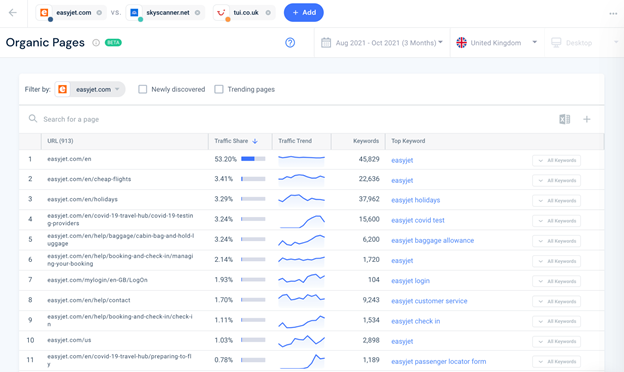 Screenshot from Similarweb Digital Marketing Intelligence, Top Organic Pages, December 2021
Screenshot from Similarweb Digital Marketing Intelligence, Top Organic Pages, December 2021Use this info to reveal what other brands are focusing on now and predict their next move.
Analyze the topics or products they’re promoting and look for revealing patterns in the data. Do their trends change month-to-month, year-to-year?
Example: easyJet
By using the Organic Pages tool, we discover that interestingly, TUI’s third-best landing page is centered around COVID testing.
A likely explanation for this is that travelers want to understand how and where to get tested before flying.
Although this page started off weak, you can see a clear uplift toward the end of the analyzed month, suggesting that TUI increased its focus on this page.
That shift is something that Skyscanner’s and easyJet’s SEO teams should make note of.
4. Uncover: See Where Each Competitor Focuses Their Efforts
It’s no secret that rankings matter – a lot. Looking at the rankings of your digital competitors through a SERP-analysis lens can give you insight into what Google likes or dislikes.
How To Get An Advantage On Top 3 Rankings
Compile a list of your industry’s top-ranking keywords.
Scour the SERPs and notate which of your competitors holds a top-three position for each specific keyword.
Calculate the average number of positions that each of your competitors holds. Use these keywords to drive your SEO strategy.
Take your strategy a step further by factoring in the types of content that rank highest for each digital competitor.
Pro Tip: An easier way to do this is to use Similarweb’s Ranking Distribution tool.
In the Ranking Distribution tool, you can see if Google “likes” a competitor’s website based on its ranking, and then use specific keyword filters to understand why.
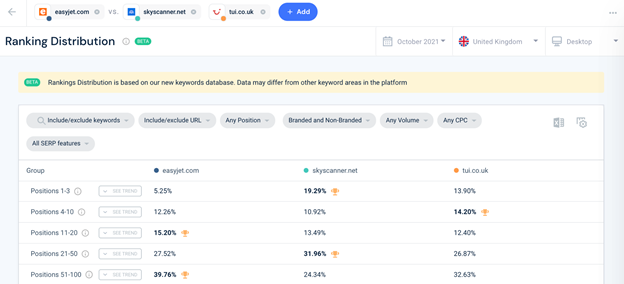 Screenshot from Similarweb Digital Marketing Intelligence, Ranking Distribution, December 2021
Screenshot from Similarweb Digital Marketing Intelligence, Ranking Distribution, December 2021Example: easyJet
Skyscanner boasts 20% of Google ranking in positions 1-3 in this competitive set.
However, if you filter by non-branded keywords and by videos, easyJet quickly jumps to the top site, claiming 81% of the top three ranking positions.
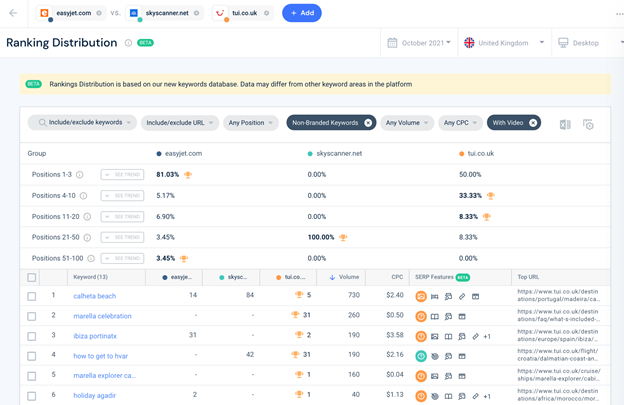 Screenshot from Similarweb Digital Marketing Intelligence, Ranking Distribution for Non-Branded Keywords with Video, December 2021
Screenshot from Similarweb Digital Marketing Intelligence, Ranking Distribution for Non-Branded Keywords with Video, December 2021This is crucial information because it allows you to know how your competitors focus their efforts and what type of content performs best for them.
In short, you’ll know if your competitors are creating strong assets and maximizing their performance or if they’re creating different types of content that drive high-impact results.
Analysis Complete: Putting It All Together
With your competitive analysis complete, it’s time to take your gloves off and put your newfound knowledge to work.
After all, the main goal of this mission is to create an actionable plan from the keywords and strategies you’ve learned from your true SEO competition.
We now empower you to make data-driven decisions about your own strategy.
In the three next steps, Similarweb’s platform will show you the easiest way to take advantage of the competition’s playbook.
5. Select: Crown Your Keyword Champions
At this point, you have a solid idea of what pages, content types, and keywords are giving your competition its advantage.
It’s time to choose the foundational keywords for your SEO strategy.
How To Pick The Best Keywords For Your Winning Strategy
On the Similarweb platform, navigate to the Keywords tool within the Competitive Analysis module.
With this feature, you can see if those top pages from step four target certain keywords such as “travel,” “summer vacation,” “couples destinations,” “family vacations,” and more.
Simply filter by non-branded performance. This enables you to check the competitive traffic share for the keyword you’re interested in.
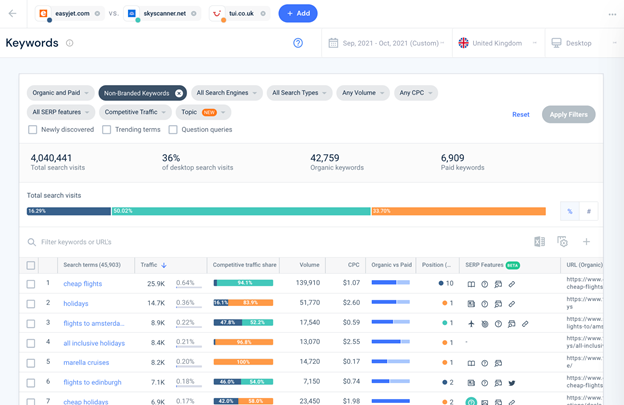 Screenshot from Similarweb Digital Marketing Intelligence, Keyword Overview for Non-Branded Keywords, December 2021
Screenshot from Similarweb Digital Marketing Intelligence, Keyword Overview for Non-Branded Keywords, December 20216. Refine: Bridge Keyword Gaps
Now that you understand your competitors’ basic SEO strategy, you need to identify your opportunities for growth and hunt down all your keyword gaps.
Luckily, our Keyword Gap tool makes this part easy.
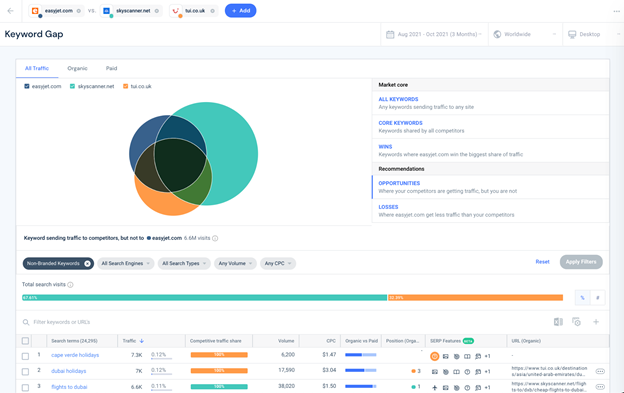 Screenshot from Similarweb Digital Marketing Intelligence, Keyword Gap, December 2021
Screenshot from Similarweb Digital Marketing Intelligence, Keyword Gap, December 2021Tap on Keyword Gap to quickly see which keywords your competitors are winning traffic on that you’re not.
Thanks to the “opportunities” recommendation on the right, you can instantly see where you should focus your efforts.
No in-depth analysis is required to see how you can grow your organic traffic share.
7. Outperform: Expand Your Keyword Horizons
If your competitors generate traffic from a core topic, research that keyword to better understand the entire landscape.
Our Keyword Generator lets you dig into data from the three biggest search engines so you can expand your keyword lists with valuable keyword ideas.
 Screenshot from Similarweb Digital Marketing Intelligence, Keyword Generator Tool, December 2021
Screenshot from Similarweb Digital Marketing Intelligence, Keyword Generator Tool, December 2021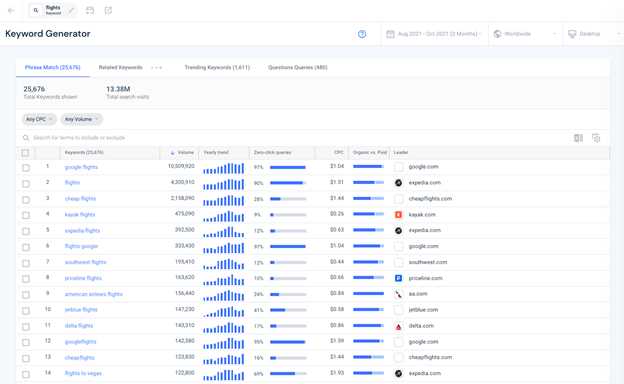 Screenshot from Similarweb Digital Marketing Intelligence, Keyword Generator Phrase Match Tool, December 2021
Screenshot from Similarweb Digital Marketing Intelligence, Keyword Generator Phrase Match Tool, December 2021Although you can learn a lot about how to improve your keyword strategy from analyzing your direct SEO competitors, you can get even more of an edge by conducting an investigation into your industry as a whole.
Tap on Keywords by Industry to get the complete breakdown of traffic leaders and their top traffic-generating keywords.
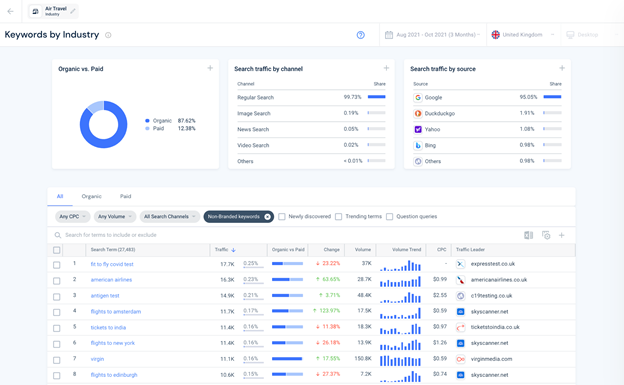 Screenshot from Similarweb Digital Marketing Intelligence, Keyword by Industry, December 2021
Screenshot from Similarweb Digital Marketing Intelligence, Keyword by Industry, December 2021May The Best One Win
SEO is an ever-changing game. Search engines constantly update their algorithms and brands always tweak their strategies, so you have to stay on your toes.
Study these seven crucial aspects of your competitor’s playbooks with Similarweb Digital Marketing Intelligence to score more SEO traffic and succeed in your industry.
Image Credits
Featured Image: Image by SimilarWeb. Used with permission.
